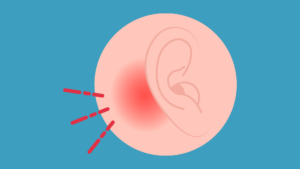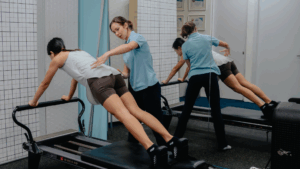Navigating the world with a persistent feeling of dizziness and instability can be a daunting challenge. Vertigo, a condition characterised by a spinning sensation, not only disrupts daily activities but can also significantly impact one’s overall well-being. In this article, we delve into the world of vertigo and explore the transformative potential of physiotherapy in alleviating its symptoms.
What is vertigo?

Vertigo is a condition that leaves individuals with a disorienting sensation of spinning or dizziness. It often arises from issues in the inner ear or the brain, disrupting the body’s sense of balance and coordination.
What causes vertigo?
Vertigo, characterised by a persistent sensation of spinning or dizziness, is a complex condition influenced by various factors. Understanding the root causes is crucial for effective diagnosis and targeted management.
At City Osteopathy and Physiotherapy, our practitioners are dedicated to identify the root causes of vertigo through extensive consultations and thorough assessments. This meticulous approach allows us to delve into the intricacies of each case, unveiling the specific triggers and contributing factors that may be unique to an individual’s experience of vertigo. By understanding these nuances, we offer targeted and effective physiotherapy interventions that address the core issues driving the vertiginous symptoms.
Inner ear disorders may cause vertigo
The most prevalent contributors to vertigo are inner ear disorders. Among them, Benign Paroxysmal Positional Vertigo (BPPV) takes the lead. BPPV occurs when tiny calcium crystals within the inner ear, known as otoliths, become dislodged and disrupt the normal fluid movement, triggering a false sense of motion. Vestibular neuritis, an inflammation of the vestibular nerve, and Meniere’s disease, characterised by fluid buildup in the inner ear, are also common inner ear culprits.
External triggers of vertigo
External factors can also play a significant role in precipitating vertigo. Head injuries, especially those impacting the inner ear or the brain, may disrupt the delicate balance mechanisms, leading to vertigo symptoms. Migraines, known for their association with severe headaches, can contribute to vertigo, often as a part of the migraine aura.
Medications: Certain medications, including those prescribed for various health conditions, may list dizziness or vertigo as potential side effects. It is crucial to be aware of these possibilities and consult with a healthcare professional if you suspect medication-related vertigo.
Underlying health conditions: Vertigo can sometimes be a secondary symptom of underlying health conditions such as cardiovascular issues or neurological disorders. These conditions may affect blood flow to the brain or disrupt signals between the brain and the inner ear.
Proper diagnosis often involves a thorough examination of medical history, symptoms, and, in some cases, specialised tests. By pinpointing the specific cause of vertigo, healthcare professionals can tailor treatment plans to address the root issues, offering individuals a path towards relief and improved quality of life.
What are the symptoms of vertigo?
Vertigo manifests through a range of distinctive symptoms, each contributing to the disorienting and unsettling nature of the condition. Being aware of these symptoms is crucial for prompt identification and seeking appropriate treatment.
- Spinning sensations:
 The hallmark of vertigo is an intense feeling that the surrounding environment or the individual is spinning or moving. This sensation can be sudden and severe, leading to a loss of balance and coordination.
The hallmark of vertigo is an intense feeling that the surrounding environment or the individual is spinning or moving. This sensation can be sudden and severe, leading to a loss of balance and coordination.
- Unsteadiness and imbalance:
Individuals experiencing vertigo often report a persistent sense of unsteadiness, as if they are swaying or tilting even when standing still. This can contribute to difficulty in walking or performing routine activities.
- Nausea and vomiting:
Vertigo is commonly accompanied by nausea, and in some cases, vomiting. The combination of dizziness and an upset stomach can significantly impact the quality of life, making daily tasks challenging.
- Difficulty focusing:
Vertigo can affect concentration and focus. Individuals may find it challenging to maintain visual and cognitive clarity, especially during episodes of dizziness. This symptom can interfere with work, reading, or other activities that require sustained attention.
- Hearing changes (in some cases):
Certain types of vertigo, such as Meniere’s disease, may be associated with changes in hearing. This can include ringing in the ears (tinnitus) or hearing loss, further adding to the complexity of symptoms.
- Headache and fatigue:
Vertigo episodes can be physically and mentally draining, leading to headaches and overall fatigue. The combination of the spinning sensation and the body’s efforts to maintain balance can contribute to a sense of exhaustion.
- Sweating and paleness:
During severe vertigo episodes, individuals may experience sweating and paleness due to the body’s response to stress. These physical manifestations underscore the profound impact that vertigo can have on the nervous system.
- Anxiety and emotional distress:
Living with vertigo can be emotionally challenging. The unpredictability of symptoms, coupled with the impact on daily life, can contribute to anxiety and emotional distress. This psychological aspect further highlights the need for comprehensive care.
Recognising these symptoms is the first step towards understanding and addressing vertigo. If you or someone you know is experiencing these signs, seeking consultation with a healthcare professional or a qualified physiotherapist is essential. Timely intervention can lead to an accurate diagnosis and the development of a tailored treatment plan to alleviate vertigo symptoms and improve overall well-being.
How can physiotherapy alleviate vertigo symptoms?
Physiotherapy emerges as a promising solution for vertigo, offering a non-invasive and personalised approach to address underlying issues. The benefits extend beyond symptom relief, encompassing improved balance, reduced recurrence, and enhanced overall well-being.
What are the benefits of choosing physiotherapy for Vertigo?
Physiotherapy for vertigo involves tailored exercises and techniques designed to retrain the brain and recalibrate the vestibular system. This holistic approach aims to restore equilibrium, reduce dizziness, and enhance the patient’s ability to navigate their surroundings confidently.
Physiotherapists employ a range of exercises that target specific aspects of vertigo. These may include gaze stabilisation exercises, head movements, and balance training. The focus is on gradually reintroducing the patient to movements that trigger vertigo, promoting adaptation and resilience.
Finding balance: Physiotherapy for vertigo management

Physiotherapy emerges as a proactive and effective approach to address the challenges posed by vertigo. By understanding the causes, symptoms, and benefits of physiotherapy treatment, individuals can take a significant step towards regaining balance and control over their lives. If you suspect you’re experiencing vertigo, consult with a physiotherapist to explore personalised and evidence-based solutions tailored to your unique needs.
FAQs
Can indigestion cause vertigo?
While indigestion is not a direct cause of vertigo, it may exacerbate symptoms in some cases. The interconnectedness of the digestive and vestibular systems highlights the importance of holistic care in managing vertigo. Addressing lifestyle factors, including diet, can contribute to a comprehensive treatment plan.
Does Reliefband work for vertigo?
Reliefband, a wearable device designed to alleviate nausea and vomiting associated with various conditions, may offer relief for some vertigo symptoms. However, its efficacy can vary among individuals, and it is essential to consult with a healthcare professional for personalised advice on its suitability.
How to fix vertigo at home?
While certain home remedies, such as staying hydrated and maintaining a healthy diet, can support overall well-being, managing vertigo at home requires caution. Physiotherapy exercises, if prescribed by a qualified professional, can be performed at home under guidance. However, self-diagnosis and treatment without expert consultation are not recommended.










